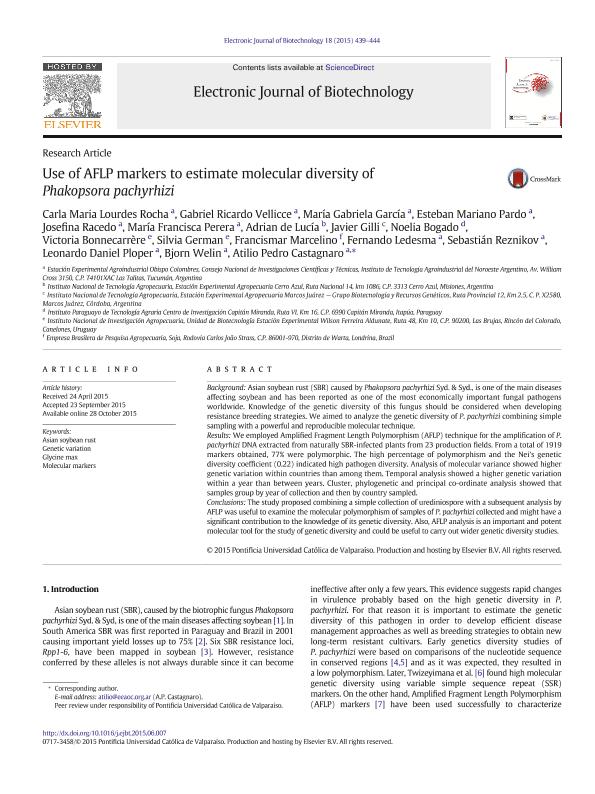Artículo
Use of AFLP markers to estimate molecular diversity of Phakopsora pachyrhizi
Rocha, Carla Maria Lourdes ; Vellicce, Gabriel Ricardo; Garcia, Maria Gabriela; Pardo, Esteban Mariano; Racedo, Josefina
; Vellicce, Gabriel Ricardo; Garcia, Maria Gabriela; Pardo, Esteban Mariano; Racedo, Josefina ; Perera, María Francisca
; Perera, María Francisca ; de Lucía, Adrián; Gilli, Javier; Bogado, Noelia; Bonnecarrère, Victoria; German, Silvia; Marcelino, Francismar; Ledesma, Fernando; Reznikov, Sebastian
; de Lucía, Adrián; Gilli, Javier; Bogado, Noelia; Bonnecarrère, Victoria; German, Silvia; Marcelino, Francismar; Ledesma, Fernando; Reznikov, Sebastian ; Ploper, Leonardo Daniel
; Ploper, Leonardo Daniel ; Welin, Bjorn
; Welin, Bjorn ; Castagnaro, Atilio Pedro
; Castagnaro, Atilio Pedro
 ; Vellicce, Gabriel Ricardo; Garcia, Maria Gabriela; Pardo, Esteban Mariano; Racedo, Josefina
; Vellicce, Gabriel Ricardo; Garcia, Maria Gabriela; Pardo, Esteban Mariano; Racedo, Josefina ; Perera, María Francisca
; Perera, María Francisca ; de Lucía, Adrián; Gilli, Javier; Bogado, Noelia; Bonnecarrère, Victoria; German, Silvia; Marcelino, Francismar; Ledesma, Fernando; Reznikov, Sebastian
; de Lucía, Adrián; Gilli, Javier; Bogado, Noelia; Bonnecarrère, Victoria; German, Silvia; Marcelino, Francismar; Ledesma, Fernando; Reznikov, Sebastian ; Ploper, Leonardo Daniel
; Ploper, Leonardo Daniel ; Welin, Bjorn
; Welin, Bjorn ; Castagnaro, Atilio Pedro
; Castagnaro, Atilio Pedro
Fecha de publicación:
11/2015
Editorial:
Pontificia Universidad Catolica de Valparaíso
Revista:
Electronic Journal Of Biotechnology
ISSN:
0717-3458
Idioma:
Inglés
Tipo de recurso:
Artículo publicado
Clasificación temática:
Resumen
Background: Asian soybean rust (SBR) caused by Phakopsora pachyrhizi Syd. & Syd., is one of the main diseases affecting soybean and has been reported as one of the most economically important fungal pathogens worldwide. Knowledge of the genetic diversity of this fungus should be considered when developing resistance breeding strategies. We aimed to analyze the genetic diversity of P. pachyrhizi combining simple sampling with a powerful and reproducible molecular technique.
Results: We employed Amplified Fragment Length Polymorphism (AFLP) technique for the amplification of P. pachyrhizi DNA extracted from naturally SBR-infected plants from 23 production fields. From a total of 1919 markers obtained, 77% were polymorphic. The high percentage of polymorphism and the Nei's genetic diversity coefficient (0.22) indicated high pathogen diversity. Analysis of molecular variance showed higher genetic variation within countries than among them. Temporal analysis showed a higher genetic variation within a year than between years. Cluster, phylogenetic and principal co-ordinate analysis showed that samples group by year of collection and then by country sampled. Conclusions: The study proposed combining a simple collection of urediniospore with a subsequent analysis by AFLP was useful to examine the molecular polymorphism of samples of P. pachyrhizi collected and might have a significant contribution to the knowledge of its genetic diversity. Also, AFLP analysis is an important and potent molecular tool for the study of genetic diversity and could be useful to carry out wider genetic diversity studies.
Palabras clave:
Asian Soybean Rust
,
Genetic Variation
,
Glycine Max
,
Molecular Markers
Archivos asociados
Licencia
Identificadores
Colecciones
Articulos(ITA-NOA)
Articulos de INST. DE TECNOLOG. AGROINDUST. DEL NOROESTE ARGENTINO
Articulos de INST. DE TECNOLOG. AGROINDUST. DEL NOROESTE ARGENTINO
Citación
Rocha, Carla Maria Lourdes; Vellicce, Gabriel Ricardo; Garcia, Maria Gabriela; Pardo, Esteban Mariano; Racedo, Josefina; et al.; Use of AFLP markers to estimate molecular diversity of Phakopsora pachyrhizi; Pontificia Universidad Catolica de Valparaíso; Electronic Journal Of Biotechnology; 18; 6; 11-2015; 439-444
Compartir
Altmétricas



